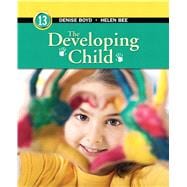
Note: Supplemental materials are not guaranteed with Rental or Used book purchases.
Purchase Benefits
What is included with this book?
IN THIS SECTION:
1.) BRIEF
2.) COMPREHENSIVE
BRIEF TABLE OF CONTENTS:
Part I: Introduction
Chapter 1: Basic Issues in the Study of Development
Part II: The Beginnings of Life
Chapter 2: Prenatal Development
Chapter 3: Birth and Early Infancy
Part III: The Physical Child
Chapter 4: Physical Development
Chapter 5: Perceptual Development
Part IV: The Thinking Child
Chapter 6: Cognitive Development I: Structure and Process
Chapter 7: Cognitive Development II: Individual Differences in Cognitive Abilities
Chapter 8: The Development of Language
Part V: The Social Child
Chapter 9: Personality Development: Alternative Views
Chapter 10: Concepts of Self, Gender, and Sex Roles
Chapter 11: The Development of Social Relationships
Chapter 12: Thinking about Relationships: Social-Cognitive and Moral Development
Part VI: The Whole Child
Chapter 13: The Ecology of Development: The Child within the Family System
Chapter 14: Beyond the Family: The Impact of the Broader Culture
Chapter 15: Atypical Development
Epilogue: Putting It All Together: The Developing Child
COMPREHENSIVE TABLE OF CONTENTS:
Part I: Introduction
Chapter 1: Basic Issues in the Study of Development
Issues in the Study of Development
Theories of Development
Finding the Answers: Research Designs and Methods
Think Critically
Conduct Your Own Research
Summary
Key Terms
Part II: The Beginnings of Life
Chapter 2: Prenatal Development
Conception and Genetics
Development from Conception to Birth
Problems in Prenatal Development
Think Critically
Conduct Your Own Research
Summary
Key Terms
Chapter 3: Birth and Early Infancy
Birth
Behavior in Early Infancy
Health and Wellness in Early Infancy
Think Critically
Conduct Your Own Research
Summary
Key Terms
Part III: The Physical Child
Chapter 4: Physical Development
The Brain and Nervous System
Size, Shape, and Skills
The Endocrine and Reproductive Systems
Sexual Behavior in Adolescence
Health and Wellness
Think Critically
Conduct Your Own Research
Summary
Key Terms
Chapter 5: Perceptual Development
Thinking about Perceptual Development
Sensory Skills
Perceptual Skills
The Object Concept
Perception of Social Signals
Think Critically
Conduct Your Own Research
Summary
Key Terms
Part IV: The Thinking Child
Chapter 6: Cognitive Development I: Structure and Process
Piaget’s Basic Ideas
Infancy
The Preschool Years
The School-Aged Child
Adolescence
Development of Information-Processing Skills
Think Critically
Conduct Your Own Research
Summary
Key Terms
Chapter 7: Cognitive Development II: Individual Differences in Cognitive Abilities
Measuring Intellectual Power
Explaining Individual Differences in IQ Scores
Explaining Group Differences in IQ or Achievement Test Scores
Alternative Views of Intelligence
Think Critically
Conduct Your Own Research
Summary
Key Terms
Chapter 8: The Development of Language
Before the First Word: The Prelinguistic Phase
Learning Words and Word Meanings
Learning the Rules: The Development of Grammar and Pragmatics
Explaining Language Development
Individual and Group Differences in Language Development
Learning to Read and Write
Think Critically
Conduct Your Own Research
Summary
Key Terms
Part V: The Social Child
Chapter 9: Personality Development: Alternative Views
Defining Personality
Genetic and Biological Explanations of Personality
Learning Explanations of Personality
Psychoanalytic Explanations of Personality
A Possible Synthesis
Think Critically
Conduct Your Own Research
Summary
Key Terms
Chapter 10: Concepts of Self, Gender, and Sex Roles
The Concept of Self
Self-Esteem
The Development of the Concepts of Gender and Sex Roles
Think Critically
Conduct Your Own Research
Summary
Key Terms
Chapter 11: The Development of Social Relationships
Relationships with Parents
Variations in the Quality of Attachments
Relationships with Peers
Behavior with Peers
Think Critically
Conduct Your Own Research
Summary
Key Terms
Chapter 12: Thinking about Relationships: Social-Cognitive and Moral Development
The Development of Social Cognition
Moral Development
Think Critically
Conduct Your Own Research
Summary
Key Terms
Part VI: The Whole Child
Chapter 13: The Ecology of Development: The Child within the Family System
Understanding the Family System
Dimensions of Family Interaction
Parenting Styles
Family Structure, Divorce, and Parental Employment
Think Critically
Conduct Your Own Research
Summary
Key Terms
Chapter 14: Beyond the Family: The Impact of the Broader Culture
Nonparental Care
The Impact of Schools
The Impact of Entertainment Media
Macrosystem Effects: The Impact of the Larger Culture
Think Critically
Conduct Your Own Research
Summary
Key Terms
Chapter 15: Atypical Development
Understanding Atypical Development
Attention Problems and Externalizing Problems
Internalizing Problems
Atypical Intellectual and Social Development
Schooling for Atypical Children
Think Critically
Conduct Your Own Research
Summary
Key Terms
Epilogue: Putting It All Together: The Developing Child
Transitions, Consolidations, and Systems
From Birth to 24 Months
The Preschool Years
The Elementary School Years
Adolescence
A Return to Some Basic Questions
Glossary
References
Photo Credits
Name Index
Subject Index
The New copy of this book will include any supplemental materials advertised. Please check the title of the book to determine if it should include any access cards, study guides, lab manuals, CDs, etc.
The Used, Rental and eBook copies of this book are not guaranteed to include any supplemental materials. Typically, only the book itself is included. This is true even if the title states it includes any access cards, study guides, lab manuals, CDs, etc.